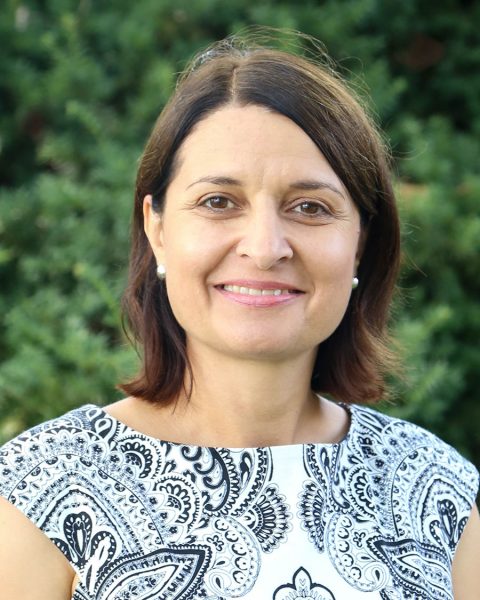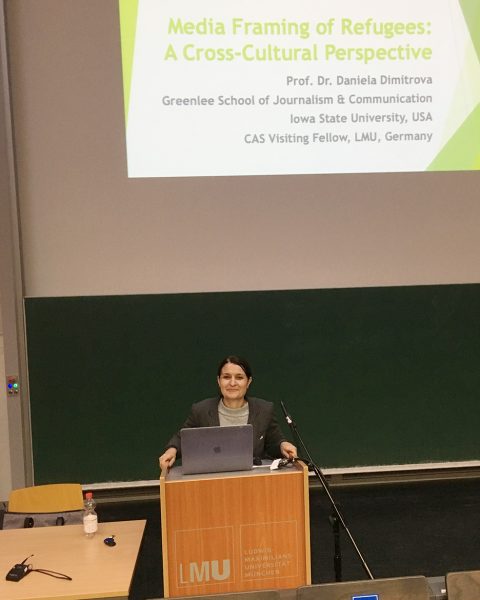
Turkey is home to almost 4 million Syrian refugees, the largest number worldwide. Greenlee Professor Daniela Dimitrova recently learned what it’s like to support them from the people serving on the front lines.
As part of a yearlong Faculty Professional Development Assignment (FPDA), Dimitrova visited Turkey in fall 2019 to research how international and local nongovernmental organizations (NGOs) advocate for and communicate about migrant populations.
Dimitrova and Emel Ozdora-Aksak, a colleague and research collaborator from Bilkent University in the country’s capital of Ankara, conducted in-depth interviews with representatives from 22 NGOs to learn about their communication campaigns.
The fieldwork is the second phase of a larger research project exploring the media framing of refugees internationally. (The first phase studied Turkish and Bulgarian media portrayals of refugees.) This recent project allowed Dimitrova and Ozdora-Aksak to take a qualitative look at the specific factors that may influence media coverage, including the role of NGOs.
Through a series of in-depth interviews with NGO communication specialists, Dimitrova and Ozdora-Aksak learned that NGOs find themselves in a tight spot. As Turkish public opinion of the Syrian “guest” population has shifted over time since Syria’s civil war began in 2011, NGOs now must carefully balance their mission to serve these populations, their obligations to their funders and the Turkish government’s stance on refugees.
“Our research findings showed that NGOs working with refugees in Turkey today are really walking on a tightrope,” Dimitrova said.
For example, the researchers learned how a seemingly benign tweet from an EU NGO marking the new academic year sparked a public outcry because it was published in Turkish — the country’s official language — as well as Arabic — the language most commonly spoken by Syrians. The “welcome back to school” tweet was also published in English, but it caused a huge public outcry because of the Arabic translation. The fallout from the tweet sent the organization into crisis management mode and led the EU delegation to Turkey to recall the tweet.
“This example shows that it’s a sensitive topic. The context is really important, and what we heard over and over in the interviews is that the context in Turkey has changed and the public opinion [of migrant populations] has shifted to more negative. At the beginning of this crisis, Turkey was very open. There’s more resentment now about refugees getting services, and all of these NGOs are very aware of the political environment,” Dimitrova said.
Dimitrova was the recipient of the Association for Education in Journalism and Mass Communication (AEJMC) Senior Scholar grant, which made this research trip possible. Some of the research findings and recommendations will be presented in an AEJMC International Communication Division panel, “A Toolkit for Researching Migration: Challenges and Opportunities in Studying Refugees/Asylum Seekers/Forced Migrants,” at this summer’s annual conference in San Francisco.

From Turkey to Germany
As part of her FPDA in fall 2019, Dimitrova also had the opportunity to visit the University of Munich, where she served as a Visiting Fellow by the Department of Media and Communication (IfKW), a leading communications department in Germany, thanks to a prestigious CAS fellowship.
Dimitrova conducted a workshop on journal publishing in the department and also gave a guest lecture on media coverage of migration from a cross-cultural perspective. While in Munich, Dimitrova met with a local NGO working with refugees and started a collaborative research project with a colleague, Viorela Dan.
Dimitrova and Dan’s project focuses on how journalists frame scientific information and how audiences make sense of scientific information, focusing specifically on photos, illustrations and charts shared by German media during recent E.coli outbreaks. The research uses media framing as a theoretical base but applies it to the science and risk communication domain.
Off to Austria
The final destination for Dimitrova’s FPDA is Vienna, Austria, where she will be a Professorial Research Fellow at the University of Vienna during spring 2020. The invitation came from University Professor Joerg Matthes, a leading scholar in the field of communication and editor of Communication Methods and Measures.
Dimitrova will give a research talk at the departmental seminar series and help develop graduate student research projects. While in Vienna, she also plans to continue her research in the area of refugee communications with the support of a Page/Johnson Legacy Scholar grant from the Arthur W. Page Center. The grant will allow her to investigate the role of NGO advocacy in the country and the region as a whole, as the global refugee crisis continues.
“I am thankful for the FPDA opportunity given to ISU faculty as well as the grant funders for their support. And of course, I appreciate all the resources and hospitality offered by my colleagues at the three host institutions without whom this research would simply not be feasible. ”
While the FPDA has provided a valuable opportunity for Dimitrova to focus on research, it also provides an opportunity to promote the Greenlee School and Iowa State University on a global stage.